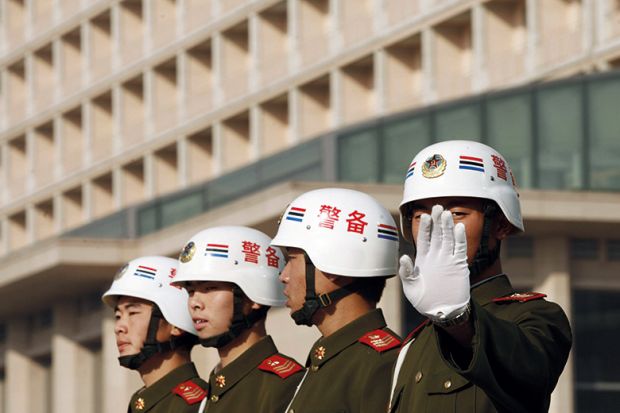The Chinese government’s decision to prevent a researcher from returning home to Australia underlines the obstacles that continue to stand in the way of attempts to establish academic exchanges with the country's universities, according to scholars.
Chongyi Feng, associate professor in China studies at the University of Technology Sydney, was held for questioning in Kunming, the capital of the southwestern Yunnan province, then barred from boarding a flight to Sydney from Guangzhou on 24 March.
A Chinese foreign ministry spokesman said the decision was taken to “safeguard national security”. Although Professor Feng is a permanent Australian resident, he was travelling on his Chinese passport.
Professor Feng, who has previously criticised restrictions on free speech in China, “had been meeting with fellow academics and intellectuals while in China, as well as human rights lawyers as part of his academic research”, Reuters said.
He was finally told that he could leave on 1 April and arrived back in Australia the following day.
An open letter on the case to Xi Jinping and Li Keqiang, China’s president and prime minister respectively, was signed by 146 China studies scholars from universities in Australia, the US, the UK, Canada and Hong Kong, among others.
The letter says that Professor Feng was "prevented from returning to his home and workplace for no reason other than his conscientious work as a China studies scholar" and that the Chinese government's actions "make it difficult for the rest of us to be confident in the research environment in China today, and do not contribute positively to the continued construction of open and productive higher education collaboration between China and the rest of the world".
Kevin Carrico, lecturer in Chinese studies at Macquarie University and one of the letter’s signatories, said that it is “impossible to create world-class universities without real freedom of speech and thought". China has a long-standing goal of creating world-class higher education institutions.
“There are people doing great things in universities in China but to perhaps understate the fact, independent and contentious thought is not rewarded; and this trend seems to be intensifying," Dr Carrico told Times Higher Education.
He said that while most academics travelling to China “are not going to face the same situation as Professor Feng, this is still something that we should all pay attention to, and make our opinions heard clearly. It is not so much a matter of whether something like this could happen to me as it is disappointment that it is happening at all."
Dr Carrico added: “China wants to have academic exchange with the world, and around the world we want to have academic exchanges with China. But for people like myself and everyone else who signed this letter, who are committed to lively and critical intellectual dialogue, situations like Professor Feng's are truly disheartening.”
Register to continue
Why register?
- Registration is free and only takes a moment
- Once registered, you can read 3 articles a month
- Sign up for our newsletter
Subscribe
Or subscribe for unlimited access to:
- Unlimited access to news, views, insights & reviews
- Digital editions
- Digital access to THE’s university and college rankings analysis
Already registered or a current subscriber? Login









